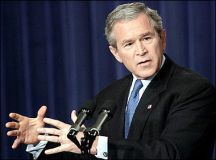US considers compromise on UN force for Darfur
Nov 9, 2006 (WASHINGTON) — The United States said it was considering compromises on the make-up of an international peacekeeping force for Darfur after Sudan rejected demands for deployment of UN troops to halt one of Africa’s worst humanitarian disasters in decades.
 State Department spokesman Sean McCormack said Washington still wanted United Nations “involvement” in the Darfur force, but he did not reiterate past US insistence the peacekeepers be deployed formally under the world body’s banner.
State Department spokesman Sean McCormack said Washington still wanted United Nations “involvement” in the Darfur force, but he did not reiterate past US insistence the peacekeepers be deployed formally under the world body’s banner.
“We’re taking a look at how we can address the various concerns that have come up from the Sudanese government, as well as others in the region, about the nature of this international force,” McCormack said.
The UN Security Council adopted a resolution in August demanding the deployment of some 20,000 UN troops to Darfur to replace an under-funded African Union (AU) force which has failed to halt the violence.
At least 200,000 people have been killed and 2.5 million others displaced since a rebellion by Darfur’s mainly black African population against the Arab-led Khartoum government erupted in early 2003.
Much of the violence has been blamed on a government-funded Arab militia, known as the Janjaweed.
Sudan President Omar al-Bashir has defiantly rejected the UN resolution, fearing the UN deployment could lead to a partition of his country or arrest government officials on charges of crimes against humanity.
Beshir refused to meet last month with US President George W. Bush’s personal envoy, Andrew Natsios, out of anger over a decision to extend long-standing US sanctions against Sudan linked to its human rights record and alleged ties to terrorism.
Natsios first signalled a shift in US policy late last month when he said in an interview that the international force for Darfur did not have to be a “blue-helmeted” UN operation as long as it was big enough and robust enough to halt the violence.
“If it does not have a United Nations helmet, but it is very competent and very aggressive, then we have fulfilled our intention,” Natsios said, suggesting the force could be made up of Africa and Arab troops backed by UN or NATO logistical support.
McCormack was more insistent on a UN role in the operation.
“This is not in any way to compromise on the need for this force and the need for an effective international force that would have UN involvement as central to it, as well as AU involvement as central to it,” he said Thursday.
Discussions on the potential make-up of the force were continuing at the United Nations and bilaterally with countries in the region, notably Arab states, he said.
(AFP)
